- Home
- BobA. Troutt
Sycamore Tales
Sycamore Tales Read online
Sycamore Tales
By Bobby A. Troutt
Copyright 2012 Bobby A. Troutt
Table of Contents
B-4
Voyage of Death
Ferguson’s Trestle at Swindler’s Point
Other Side of Nowhere
The Garden of the Seventh Trellis
Plea of Not Guilty
*****
Sycamore Tales
B-4
John Patrick Doyle #748912
Stoney River State Correction Facility
Cell Block B, Cell 4 – McCoy County
Little Creek, Tennessee
It was the spring of 1973 when I laid down in my bunk to the clicking sound of the cell doors of B-block being locked down for the night. The last things I heard were the footsteps of the guard walking away and the dangling of his keys as he turned the main lock for the cell doors to close. When the guard killed the lights, there was nothing but darkness all around. I laid there listening to the snoring of some of the other inmates down the block. Sometimes, in the night, I can hear someone fighting, screaming and hollering from being raped. Somehow, someway they are able to get to you whether it is through a crooked guard or a gang. The strong survive and the weak fall; the weak have no chance or mercy. When the locks turn, during the day or night, everyone is vulnerable and subject to die. If you were one of the fortunate ones, you lived to see another day. I learned very quickly to stay to myself and not fall victim to the hands of others. There is constant fighting, stabbing and raping behind these walls; it seems to be the normal way of life behind prison walls. Prison seems to have a way of turning animals into worse animals. If your life on the outside is rough, nine times out of ten it is only going to get worse on the inside. The stale ‘dead air’ from the block lingers with the dominating smell of sweat and body odor. The bars have been painted many times but they are still chipped and rusted in several places. Each cell has a bunk and a stainless steel commode with a sink on top. The concrete block wall cell that houses each inmate is only a six foot by eight foot square with concrete floors. The bullpen where we hang out, play cards and kill time is located between the two cell block towers. That is where we mix and mingle with each other, but we are still caged in like animals with the guards watching over us with guns. Sometimes I wonder if it ain’t just as bad on the outside.
From time to time, I think back of when I was growing up and how I used to live on the streets. I prowled around a lot and slept wherever I could, under bridges, city parks and sometimes in fields. I would go around to restaurants and do small jobs like sweeping the parking lot or taking out the trash in exchange for something to eat. When the weather was bad I would sleep on sheltered park tables. If the weather was really bad I would go to the nearby mission. I carried a small bucket around with me so I could get water in to wash up; I hardly ever had soap. When it was warm, I would take my clothes off down to my shorts and wash. In the winter I washed at the mission. One time when I was taking a shower at the mission, three men came in and tried to rape me. Fortunately, I was able to back them off with my knife and get away. There are so many stories and so many things, at times, that make me wonder how I even survived on the street. I was taken to jail I don’t know how many times for loitering. It’s funny when you are young how things go and you never think twice about the outcome. And when you get older, you think things will get better but they don’t. What we fail to realize is that it all boils down to the choices we make.
I was sitting in my cell playing solitaire when the guard came to get me. He told me John, the warden, wanted to see me. I slowly got up and turned around with my hands behind my back so they could place the handcuffs on my wrists. As they led me to the warden’s office, I had no idea what this visit with the warden was all about, unless it was about the fight I got into last week. I had already served four days in the hole for that. But, around here you never know; someone could have lied on me. Snitches don’t live long in here. After going through a series of barred doors and up several stair steps, we finally entered the warden’s office. The warden was on the phone; he motioned for us to take a seat. When he hung up the phone, he told me that the board of appeals was granting me a new hearing. I didn’t know what to say; I was at a loss for words. I had petitioned the board four times and each time they turned me down. But, finally, they were willing to listen to me. He instructed the guard to take me back to my cell. I was stunned and in disbelief as the guard led me out of the warden’s office. I had been convicted of murder in the first degree and aggravated robbery. The court sentenced me to fifty years; I have already served twenty-five of them. Now, after all this time, they are willing to review my case. It was the best news I had heard in a long time. Back at my cell, I laid down for a few minutes, reveling in that moment of hope.
Two days later, the guard came to my cell and told me I had a visitor. I did my usual ritual of turning around with my hands behind my back to be cuffed. As he led me to the visitation room, I had no idea who it could be. It had been a long time since anyone had come to see me. The guard slowly opened the door to the visitation room and let me in. He closed the door behind me and stood guard outside the door. As I took my seat at the booth, I saw a young man in front of me; I had no idea who he was. He picked up the phone and so did I.
“I know you don’t know who I am, but my name is Keith Taylor an attorney,” he said.
I didn’t say anything; I just listened.
“I found out that you are going up before the board of appeals and I would like to represent you.”
“Why?” I questioned. “I don’t have any money to pay you.”
“I am fascinated with your case and I believe I can help you,” he explained, “and I’ll do it pro bono.”
I sat a minute and didn’t say a word; it all seemed like a dream. Why after all this time were things starting to turn around. I told him to let me think about it. I figured there must be more to it than this. He told me he understood my doubts as he slid his business card under the glass partition. I told him I would get back with him and yelled for the guard. The guard came in and escorted me back to my cell.
A few days later, I got word to him that I would like for him to represent me. He arranged contact visits through the warden so we could go over my case. I didn’t know there was so much to it. He came twice a week; we went over and over the case trying to build a new case to stand on at the appeals. Days and days passed, he read the trial transcript several times looking for any loophole such as mistakes and trial errors that might have occurred. He even checked the evidence that had been presented in court. He went over and through everything that pertained to my case, the testimony, witnesses and anything that could open the door for them to set me free. Keith believed that I was innocent and falsely imprisoned. He believed if he could create a shadow of doubt in one of the members on the appeal board, they would recommend I receive a new trial.
Finally, the day arrived for me and Keith to stand before the board. He presented evidence that was brought out at the trial. That evidence along with the trial transcript, he was able to justify his reasoning for a new trial. This created doubt and helped uncover flaws in the first trial. As he proceeded, he informed the board of some circumstantial evidence that was presented against me that was irrelevant and caused pertinent facts to be overlooked that would have led to a different outcome of the trial. He told them those circumstances held a strong bearing in determining if I was guilty or innocent. In his closing statement to the appeal board, Keith presented the fact that I had already served twenty-five years of a fifty year sentence and that I have been a model prisoner. Before he took his seat, he handed them a letter from the warden re
garding my behavior. The board asked me to come forward. They questioned me about my prison time and rehabilitation. They wanted to know what I had with myself since I had been incarcerated. I informed them that I had studied for and passed the GED exam and that I had also enrolled in some college classes from the nearby college that holds classes at the prison and that I had also learned a trade. After they questioned me, they asked me and Keith to step outside for a few minutes so they could discuss my appeal. About thirty minutes later, the board sent word for us to come back in; they had reached a decision. After reviewing the evidence and considering my rehabilitation, the board had decided to recommend that the court reverse the standing verdict and grant me a new trial. My heart literally stopped; I couldn’t believe what I had just heard. For once in my life, I was getting a second chance. Keith thanked the committee for giving me a second chance to prove my innocence. The chairman of the committee stated that the motion had been made and carried. He slammed his gavel down and dismissed the session.
Keith gave me some encouraging words as we headed back to the prison van, but I knew the hard work had only just begun. Keith told me the groundwork for the new trial had been laid out, but the hard work lay ahead. Because going before a new judge and twelve new jurors to defend my innocence and receive a not guilty was not going to be as easy as it was before the appeal board. He said for me to be set free, twelve jurors were going to have to be convinced that I had been done wrong by the judicial system and that I had already sacrificed twenty-five years of my life in prison for a crime I did not commit. He told me to hang in there and that he would be in touch.
The guards escorted me back to the prison where I would wait for the courts to set a date. On the way back to prison I couldn’t get over how good a job Keith did especially since he was right out of law school. I was very impressed and very pleased he would represent me at the new trial. But, he didn’t tell me until later that he had an uncle on the appeal board. As we drove on, the guard who was driving turned on the radio; he tuned it to a rock and roll station, WHIN. Apparently, the other guard didn’t like rock and roll so he changed it to WAMG, a country station. This caused a big argument so they ended up turning the radio off. At that moment, any music would have made me feel good. I thought about songs I listened to when I was growing up; they brought back a lot of memories. It’s funny how you forget all of the small precious things when you are locked up. It is odd how we only dwell on the bad things that come our way. Finally, we arrived back at the prison which was about three miles outside of Little Creek. The guards took me through the normal process of being searched before I was taken back to my cell. A lot of the guys were asking me about how it went with the board of appeals and I told them I got a new trial. A lot of them were glad, but the majority of them didn’t give a damn. When I settled down inside my cell, I took a deep breath and tried to relax. I couldn’t believe it; I was getting a second chance. I started to wonder about some of the first things I wanted to do when I was released; there were so many things I wanted to do. It had been a long time since I had been involved in a relationship. I wondered if I… Well, anyway I’ll have to cross life’s bridges as I come to them. I eased back on my bunk and continued my wishful thinking.
I was fifteen when I got expelled from school for smoking pot. Not long after that, my daddy started physically abusing me. After so many beatings, I decided to leave home; I moved around a lot and picked up small jobs just to get by. I was arrested several times before I got a full-time job. Unfortunately, that didn’t last long; I got fired. I knew I eventually would because I was always late; I had to walk to work and it was a good piece away. After that, I was in and out of drug and alcohol rehabilitation programs for years. I have to say, my life has been something.
Then, out of the blue, my mind wandered to the night in the alley. All I know is that everything happened so fast. I came upon the dead body lying in the alley. I knelt down beside it to see if there was anything I could do to help. I saw the crowbar lying next to the body. Without thinking, I picked it up. And that’s when all the drama started. The police rushed into the alley with their headlights on bright and their blue lights flashing; the lights were so bright I couldn’t see. The police jumped out of their cars with their guns pointed at me, yelling for me to drop the crowbar, get down on the ground and put my hands behind my head. I froze in my tracks; I didn’t know what to do because I hadn’t done anything wrong. All I could think to do was yell out that I didn’t do it; I was only trying to help him. But, that didn’t matter to the police. They repeatedly told me to drop the crowbar and get on the ground. Slowly, they began to move in. I dropped the crowbar when one of the officers pushed me down on the ground and cuffed my hands behind my back. I never said another word; it wouldn’t have made a difference anyway. The situation I had been found in had already told my story. By the time I could get myself together, I was already locked down in the county jail. I didn’t know what to do or where to turn. It wasn’t long before they had me in the interrogation room questioning me about what had happened. Detective Barry Whitaker and Detective James Bailey were in charge of the investigation. They asked me what had happened in the alley. I tried to tell them but they were convinced I had committed the murder; they were adamant that it was a drug deal gone wrong. But, I continuously insisted that it wasn’t.
They wanted to know how I was connected to Larry Joe Walker, the deceased. I told them I had never seen him before until that night in the market.
“He was at the counter paying for his stuff when I came in,” I explained. “When I left the market, I thought I heard something in the alley. When I glanced down the alley, I saw someone lying in the alleyway. I went to see if I could help them. As I was kneeled down beside the body, that’s when the police came up.”
Detective Whitaker then spoke up, “The clerk at the market said you and Larry Joe came in about the same time. He thought ya’ll were together. In fact, he was sure that the two of you came in together around nine o’clock.”
“Where all have you been tonight?” asked Detective Bailey.
I had to stop and think for a minute. Everything was happening so fast; I couldn’t think. Then I remembered my girlfriend and I had been partying all night.
“My girlfriend and I hit a few clubs and then we went back to her place,” I replied.
“What’s her name and how can we get in touch with her?” asked Detective Whitaker.
“Her name is Ashley Frye, but on the street they call her Brandy. She lives in the apartments around the corner from the market. Talk to her, she’ll verify my story,” I encouraged them. “But, I’ll tell you one thing, there was someone else in that alley tonight; heard them. Why won’t you believe that?” I asked.
“We will check it out,” said Detective Whitaker.
“Can I go?” I asked.
“Not now,” replied Detective Whitaker. “We have a few more questions.”
“We’ll let you know when you can go,” spoke up Detective Bailey.
After about another thirty minutes of interrogation, they had a deputy take me back to my cell and I waited for them to release me. I hadn’t done anything wrong. Early the next morning, they came and took me back to the interrogation room for some more questioning. Detective Whitaker said they had talked with Brandy and she told them exactly what I had said, that we had been out partying and then went back to her place. They also asked her she or I knew Larry Joe Walker and she told them she didn’t, but she wasn’t sure if I did or not. She also told them that we went to bed around eight o’clock. And when she got up around eight-thirty to use the bathroom, I was still in bed asleep and when she woke up again, about ten-thirty, I was gone.
“Where did you go after you left Brandy’s apartment?” asked Detective Bailey.
“I couldn’t sleep so I got up and I walked down to the market to get some cigarettes,” I explained.
“It was eight forty-five, I guess. What about the other person in the alley? Did you find out anything about that?” I questioned.
“We do have the videotape from the convenience store’s camera located in the alley. It doesn’t show any third person, only you and the deceased,” replied Detective Bailey. “Part of the tape is damaged from the weather, but the lab is working on repairing it. However, although the videotape is in black and white and has a lot of snow in it, we can identify that it’s you kneeling over the body with the crowbar in your hand. Another puzzling thing is there were no cigarettes in your possession or a lighter when you were arrested.”
“I must have lost them,” I replied.
“Brandy did tell us you were a heavy smoker. But, I know you couldn’t have smoked a whole pack in that short amount of time.”
About that time, I heard the clicking of the cell doors being locked down for the night, interrupting my recollecting thoughts. When the guard called out lights out, the blank of darkness filled the block. I eased down in my bunk and closed my eyes. It has been a wild day, I thought to myself as I drifted off to sleep.
Weeks had gone by, but Keith kept me informed of what he was doing. He was trying to get me a court date on the docket. But, it was slow going. The courts were overrun with cases. About a month later, Keith came by with some good news. My trial date was in three weeks. For the next few weeks, my nerves were on edge. I wanted to be free so bad. But, I wondered if I could make it out in the free world. I had been locked up for twenty-five years and I knew things had changed. The world and life had gone on by. I didn’t know if I could adjust and make it. After twenty-five years in prison and this way of life I should be able to make it. However, prison is all together a different way of life. You either make it or you don’t. Being free is something else, it’s the other side of the coin and the courts are the ones who flip it.
Finally, my day in court arrived. I had been transferred the night before to the county jail; I would be transported to court from there. When the guard came and got me I was polishing my cell floor with shoe polish. It puts a real clean shine on the floor and stays shiny for a long time. On the way to the county jail, I remember a black cat crossed the road in front of us. The guard that was driving said it was bad luck but the other guard said that is was good luck since the black cat crossed the road to the right side. He explained that when it is crossing to the right it is good luck and when it is crossing to the left it is bad luck.
“I never have heard that,” said the guard driving.
“It’s an old saying,” replied the other guard.
I was sure hoping that might be an omen for me that my luck was going to change for the better. Keith had come by the jail to go over some last minute preparations. He had also bought me a suit to wear for the trial. I was so nervous; I didn’t know how things were going to turn out. So needless to say, I didn’t get a good night’s sleep; I tossed and turned all night. Morning of the trial day came early or so it seemed. After breakfast, I nervously waited for them to escort me to the courthouse. I watched the clock, rung my hands and patted and shuffled my feet. Then I heard the old familiar clicking sound. It was time to go; Keith had come over to the jail to walk with me. As we entered the courtroom there was a few people. We sat down at the table in front of the courtroom. The bailiff stood to the side of the judge’s bench. I didn’t know what to think or feel. I never dreamed I would ever get another chance at life. But, my dream was coming true. About that time the bailiff spoke.
“All rise, hear ye, hear ye Honorable Judge Necole Depetrillao presiding. You may be seated; the Commonwealth State of Tennessee vs. John Patrick Doyle, Docket # 2437851. Court is now in session.”
“Counselors are you prepared and ready?”
“Yes your Honor,” replied the prosecution.
“You may proceed,” ordered the judge.
“Ladies and gentlemen of the jury you have the say and the duty to listen to the facts and the evidence of this case in the outcome of John Patrick Doyle, the defendant,” stated the district attorney as he started his opening remarks. “It is my job to present you with all the facts and evidence of this case. It is completely and totally up to you, the jury of twelve people of his peers, to find him guilty or not guilty. The motive in this case is robbery and murder. Mr. Walker, the deceased, had gone into the market with a wad of money which Mr. Doyle saw. Mr. Doyle followed him outside and brutally killed him. The defendant was found red-handed; he was found kneeling over the body of Larry Joe Walker, the deceased, with a crowbar in his hand. Mr. Doyle’s bloody fingerprints were all over the crowbar. The defendant says he picked it up without thinking. But, I ask the question. Was he in the act of laying it down after he brutally killed the deceased? It is your job to come to the conclusion of the facts and evidence which will determine the outcome of this trial. John Patrick Doyle has been granted a new trial. He has already been tried once by a jury of twelve who had heard the facts and evidence of his case. They found him guilty of second degree murder. He was sentenced to fifty years in prison; he has served twenty-five of those years. My job is to see that he stay in prison and serves the rest of his time. In view of the facts and evidence, I hope to prove to you without a shadow of a doubt that John Patrick Doyle is nothing but a cold blooded and heartless murderer who showed no mercy on his victim. And the same should be done to him. He took another man’s life for a few dollars.”
“Ladies and gentleman of the jury,” stated Keith as he began his opening remarks. “As you know, my job is to present an unraveling case of falsehood for my client, John Patrick Doyle. I will prove to you that he is an innocent victim of the judicial system. That he is one of others who have fallen through the cracks and wrongfully accused and charged with a crime he didn’t commit. Yes, like the prosecution said, it is left up to you to review the facts and evidence of this case and come to an open mind that the defendant, John Patrick Doyle, is not a vicious killer without mercy. He simply was at the wrong place at the wrong time. He made a huge mistake of stopping and bending down beside the body of Larry Joe Walker to see if he could help him. I ask only one thing; please take into consideration the new evidence that I will introduce and the facts of this case. I want you to take into consideration that Mr. Doyle has already spent twenty-five years of his life wrongfully behind bars. The prosecution says the motive was robbery and murder. There was no large sum of money found on my client when he was arrested. Yes, there was money found on the body of Larry Joe Walker. But, was it robbery or was it like the prosecution’s crowbar theory. Was he putting it down after killing the victim? I doubt it!”
“Prosecutor, are you ready to call your first witness?”
“Yes, your Honor, I call Guthrie Harris,” he replied.
The bailiff swore Mr. Harris in.
“Mr. Harris what do you do for a living?” asked the prosecutor.
“I own and run Guthrie’s Stop and Shop,” he answered.
“Do you sell cigarettes at your market?” questioned the D. A.
“Yes, sir, I do.”
“Did Mr. Doyle buy any,” asked the D. A.
“No, sir, he didn’t by any cigarettes,” Guthrie replied.
“Objection,” cried Keith. “He’s trying to lead the witness and come to a conclusion.”
“Overruled,” stated the judge.
“Now, that evening on the date in question, can you tell us what happened?” asked the D. A.
“I was about to close when I saw Mr. Walker come in the store. I remember him because he walked around the store several minutes. Finally, he came up to the checkout counter and bought some lottery tickets. He took a huge roll of money out of his pocket. When I looked up, I saw Mr. Doyle looking in the window,” Guthrie explained.
“What happened then,” probed the D. A.
�
��I looked back at Mr. Walker and gave him his lottery tickets. He put his money back in his pocket and headed toward the door.”
“Objection,” shouted Keith. “He’s calling for a conclusion.”
“Objection sustained,” replied the judge.
“It appears to you that he was leaving,” stated the D.A.
“Yes, sir,” replied Guthrie.
“What happened after that?” questioned the D. A.
“Mr. Walker left and held the door for Mr. Doyle to come in. But, I noticed Mr. Doyle turned around and went back out,” said Guthrie.
“What did you do then?” asked the D. A.
“I locked the doors and closed for the night.”
“Had you ever seen either of the two men before that night?” asked the D. A.
“I had seen Mr. Walker in the store before. He had bought some lottery tickets, I think, two or three times before,” explained Guthrie. “But, I had never seen Mr. Doyle before that night.”
“What caused you to remember him?” asked the D. A.
“He had a birthmark on the right side of his neck,” replied Guthrie, “right down below his ear.”
“Why did you happen to notice that?” questioned the D. A.
“I wouldn’t have,” he said. “But, he reached up and rubbed his neck. That’s when I noticed it.”
“Let the record show that the defendant has a birthmark on the right side of his neck down below his ear,” stated the D. A. “That’s all, your Honor.”
“Do you want to cross examine counselor?” asked the judge.
“Yes, your Honor, I do,” replied Keith. “What you are saying Mr. Guthrie is because the two men left at the same time and Mr. Walker had a large roll of money my client robbed him. Could it have been someone else in the alley?”
“I object,” cried the prosecutor. “He’s trying to lead the witness and come to a conclusion.”
“Your Honor, there has never been a doubt,” said Keith, “that Mr. Doyle was not at the store and that Mr. Walker had a large roll of money. Just because Mr. Walker had the money and they left about the same time it doesn’t prove that my client killed him.”
“Objection overruled,” replied the judge.
“No further questions at this time,” said Keith.
“Call your next witness, counselor.”
“The prosecution calls Randy Henson. Mr. Henson you work at the state crime lab where we send a lot of our police work,” stated the D. A.
“Yes, sir,” he replied.
“Can you give us your professional opinion on the lab work for this case?” asked the D. A.
“Well, sir,” he replied. “There was Mr. Walker’s blood on the crowbar as well as Mr. Doyle’s. Both of them have the same blood type, B-positive. Mr. Walker had been hit on the side of his head. There was also a bloody fingerprint on the crowbar.”
“Who did the print belong to?” asked D. A.
“Mr. Doyle, the defendant,” he said. “The blow to the side of Mr. Walker’s head was the cause of death.”
“Was there blood found on any other evidence?” questioned the D. A.
“Yes, on the shirt that belonged to Mr. Doyle that the police confiscated at his arrest.”
“Whose blood was that?” asked the D. A.
“Mr. Walker’s,” replied the tech.
“No further questions,” said the D. A.
“You may cross examine,” replied the judge.
“So, what you are saying is that you are basing your professional opinion on the fact of two people’s blood type being the same,” reiterated Keith.
“No, I’m not,” he replied. “I’m saying…”
“Did the crime lab botch up the testing of the two men’s blood in question?” cried out Keith. “Did they fail to test the makeup of both bloods to assure there were not two different types?”
“Yes, I can explain,” he replied.
“Objection your honor,” cried out the D. A.
“Overruled,” replied the judge.
“Is it possible that Mr. Walker’s blood could have gotten on Mr. Doyle’s shirt when he bent over the body to see if he could help him and just as well when he picked up the crowbar without thinking?”
“Yes, I guess,” replied Mr. Henson.
“Is it possible,” asked Keith, “yes or no?”
“Yes,” he answered with frustration.
“Anymore questions, counselor?” asked the judge.
“Just one, your Honor,” replied Keith. “How long have you been with the crime lab?”
“About eight years now,” he replied.
“From the best of your knowledge, has anything like this ever happened before?” Keith asked. “Has the failure of the lack of makeup from the blood sample of a case ever failed to be 100% accurate?
“Yes,” he said.
“Giving your professional opinion, how many times do you think this has happened?’
“Several times; I know of at least six or eight times over the course of my career.”
“Thank you, Mr. Henson” said Keith. “I have no further questions, your Honor.”
“Your Honor, if I may, I would like to clear one point,” requested the D. A.
“You may go ahead, counselor, but keep it brief,” warned the judge. “It’s getting close to lunch.”
“Out of all those times that you just mentioned, how many of them were found guilty because of a blood test?” questioned the D. A.
“More than half,” replied Mr. Henson.
“You may step down,” instructed the judge.
“Your Honor, I would like to present the state’s exhibit A, the crowbar. It is the bloody crowbar covered with the blood and fingerprints belonging to the defendant that was used to kill Larry Joe Walker.”
“Any comment on this exhibit of the state?” asked the judge.
“Only one; it should state the assumed killer of Larry Joe Walker,” replied Keith.
“I see your point. Counselor, you may enter it into the court with assumed killer,” corrected the judge. “Your next witness,” ordered the judge.
“The state calls Matt Coley,” said the D. A.
“Mr. Coley, what do you do for a living?” asked the D. A.
“I work with video surveillance cameras,” he replied.
“Can you fill us in on the final results of the videotape that was found in the alley the night Larry Joe Walker was murdered?” asked the D. A.
“Well, sir, the tape was in black and white and the weather had damaged most of it. But, I was able to determine there were two men in the alley. Mr. Walker I could make out; the other person was not as clear. That person had their back to the camera most of the time,” he said. “But, I was able to see a shot of his neck when he turned around. It happened so quickly I really couldn’t say for sure if it was Mr. Doyle,” he said.
“In your opinion, from your experience and training, did the mark appear to look like a birthmark,” inquired the D. A.
“I object your honor,” cried Keith. “The D. A. is grasping for straws.”
“Objection sustained,” said the judge. “Counselor, get to your point.”
“Sorry, your honor,” replied the D. A. “Could it have been a birthmark?”
“Yes, I…” replied Mr. Coley.
“No further questions,” stated the D. A.
“You may cross examine,” directed the judge.
“I have one question,” said Keith. “Could it have been something besides a birthmark?”
“Yes, sir,” he stated. “You couldn’t really tell.”
“That’s all, your Honor.”
The judge dismissed for lunch; the trial would convene at 1:00 p.m. The bailiff instructed everyone to rise as the judge left the courtroom.
As the courtroom emptied, Keith and I went across the street for a bite to eat. As we ate our lunch, we discussed the trial. He didn’t think it looked bad, but you can never be too sure in j
udging a jury. All he had to do was create doubt in one juror and the rest could follow. One o’clock came around quick. The courtroom was filled once again.
“All rise, Honorable Judge Necole Depetrillao presiding. You may be seated,” said the bailiff.
“You may call your next witness, counselor,” instructed the judge.
“The state calls Detective Barry Whitaker,” said the D. A. “On the night in question, did you and Detective Bailey answer a call of a homicide in the alley on First Street?”
“Yes, we did,” answered Detective Whitaker. “Well, sir we found Mr. Doyle squatted down next to the body of Larry Joe Walker,” replied Detective Whitaker.
“And how did that appear to you?” asked the D. A.
“Well, Mr. Walker was lying on the ground and blood was running from the side of his head. Mr. Doyle was beside him with a crowbar in his hand,” replied Detective Whitaker.
“Then what?” questioned the D. A.
“We arrested Mr. Doyle,” he said. “We took him downtown and questioned him. We charged him with murder.”
“Did he have a lawyer?”
“He received a court-appointed attorney.”
“That’s all, your Honor,” stated the D. A.
“Now, Detective Whitaker,” spoke Keith as he approached the witness stand. “Did Mr. Doyle, at any time, tell you that there was someone else in the alley?” asked Keith.
“Yes, sir, he did,” replied Detective Whitaker.
“At any time, did you check to see if there was another person there that night in the alley?” Keith questioned.
“No, sir, not really,” said the detective.
“No further questions, your Honor,” replied Keith.
“Your Honor, I call Detective Bailey to the stand,” said the D. A.
“Do you support and testify to Detective Whitaker’s testimony?” asked the D. A.
“Yes, I do,” he replied.
“And how long have ya’ll worked together?” questioned the D. A.
“About twenty years,” he replied.
“And when you arrived on the scene of the crime,” said the D.A., “did you come to the same conclusion that it looked like Mr. Doyle had murdered Mr. Walker?”
“Yes, I did,” stated Detective Bailey.
“No further questions, your Honor.”
“One brief question, your Honor,” replied Keith. “Could there have been another person in the alley at that time?”
“Sir, I…” he replied.
“Answer the question,” demanded Keith.
“Yes,” he said.
“Thank you, detective.”
“Defense, are you ready for your first witness?” asked the judge.
“Yes, I am, your Honor,” Keith said. “But first I would like to present the defense’s Exhibit A. A document from the warden at Stoney River stating that while my client has been incarcerated there he has been a model prisoner. I also have defense’s Exhibit B, documents that include his GED, a certificate of his trade and his rehabilitation records from prison.”
“Your request has been accepted,” replied the judge.
“Your Honor, I call Ashley Frye to the stand,” he stated.
“Now, Ashley,” he started to say before she interrupted.
“You can call me Brandy,” she said, “everyone does.”
“Okay, Brandy,” he replied. “You have known John Patrick for about three years. Can you tell us about him since you have been his girlfriend, on and off, for the past three years?”
“Well, he’s a nice guy,” she said, “quiet in a way and sort of distant at times. But, we have a lot of fun together, clubbing, you know what I mean.”
“Has he ever mistreated you?” Keith asked. “Has he hit you or anyone else?”
“I object your honor this is irrelevant to the case,” cried out the D. A.
“Objection sustained; make your point counselor,” warned the judge.
“Do you know of a time when Mr. Doyle physically hurt anyone? Did he ever inflict bodily harm to any one?” questioned Keith.
“No,” she said.
“I have no further questions,” stated Keith.
“You may cross examine, counselor,” instructed the judge.
“I have no questions,” replied the D. A.
“Call your next witness, counselor,” ordered the judge.
“Your Honor, may I approach the bench?” requested Keith as the prosecutor approached the bench right behind him. “Your Honor, I was going to have the coroner here but he is out of town. However, I do have a written affidavit from him with his testimony. There is a statement in here I would like to address the jury with, if I may have your permission.”
“Okay, counselor,” she said. “I will allow it this time. But the next time, make sure your witness is here.”
“Thank you, your Honor,” Keith said as the D.A. returned to his seat. “Ladies and gentlemen of the jury, I have here a written affidavit from the coroner which you will receive a copy of. I would like to make a statement about the coroner’s report. It states that the blow to the head of Mr. Walker was probably done by a left-handed man. I want to state that John Patrick Doyle is right-handed.”
Then unexpectedly, the D. A. wadded up a piece of paper and pitched it at John Patrick. Without thinking, he caught it with his left hand.
“I have no questions, your Honor,” said the D. A. with a smirk on his face.
The judge banged her gavel down on the bench and told them to meet her in her office. A few minutes later, they reentered the courtroom and proceeded with the trial. The trial went on for two more days. Finally, the closing arguments were presented. Each attorney boldly stressed their side to the jury. It looked like I had about a 50/50 chance, but who knows. The jury received their orders from the judge and went out to deliberate. Keith and I sat outside on the bench next to the courthouse. We noticed some old men sitting on a bench whittling and chewing tobacco. They had whittled so much they had huge piles of cedar shavings. I told Keith that I appreciated all that he had done for me. It was more than anyone had ever done. About that time someone came to the courthouse door and yelled the jury was in. Quickly, we got up and rushed in.
“All rise,” said the bailiff. “You can be seated.”
“Has the jury reached a verdict?” asked the judge.
The jury foreman said, “We have, your Honor.”
The foreman passed the note to the bailiff and he gave it to the judge. After she looked at it, she handed it back.
“Will the defendant please rise,” stated the judge.
Keith and I rose to face the jury. I held my breath as the foreman started to read the verdict.
“Not guilty,” said the jury foreman.
My legs almost went out from under me. Keith turned around and gave me a big hug. The judge dismissed the jurors and the trial. As we made our way out, I looked at the D. A. and he looked back hard at me as he told Keith that he had just got a killer set free.
Keith started to say something, but I stepped in between them. They each backed off and we left. On our way back to the prison, we stopped off and got a bite to eat. I never knew food could be so good. Keith didn’t have too much to say; he seemed a little distant. It must have been what the D. A. had said when we were leaving the courtroom. But, it didn’t matter now. I was free and going to start a new life somewhere other than prison. We stopped off at the prison so I could get my things. The warden had already instructed the guards to get them from my cell. The warden gave me two-hundred dollars and wished me well. I would never hear the clicking of the cell doors locking down anymore. After we left the prison, Keith took me to the bus station. On the way there, I could tell something was eating at him. When we arrived at the station, I went in to get my ticket. The bus headed north would be leaving in about ten minutes. I had figured out what was wrong with Keith when he told me he had one question for me.
“John, were you picking up the crowbar or were you laying it down?”
I was silent; I didn’t say anything for a moment. I looked over at him and said, “I was laying it down.”
“So, you really did kill him,” said Keith.
I looked up at him and starred into his eyes. I never said another word, but I nodded my head yes and walked away. After I boarded the bus, I saw Keith sitting in his car at the bus station. I thought to myself as the bus pulled away. My intent was to rob the market. But, I changed my mind when I saw the man with the roll of money.

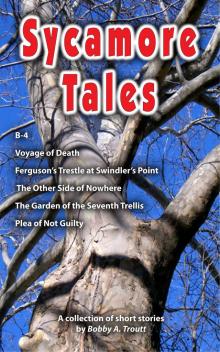 Sycamore Tales
Sycamore Tales Jawbreakers, Bubble Gum and Stick Candy
Jawbreakers, Bubble Gum and Stick Candy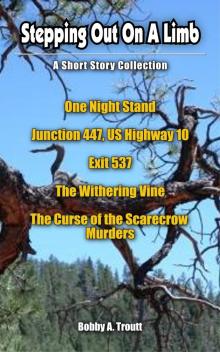 Stepping Out on a Limb
Stepping Out on a Limb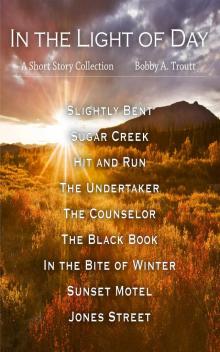 In the Light of Day
In the Light of Day Still Wind, Forgotten Days
Still Wind, Forgotten Days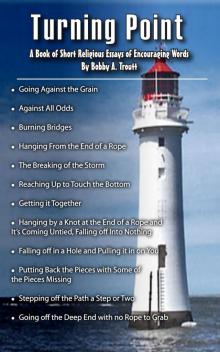 Turning Point
Turning Point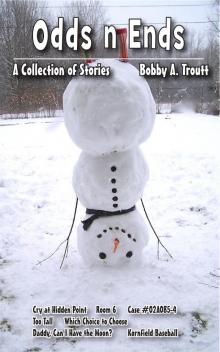 Odds n Ends
Odds n Ends Giggle Book Three
Giggle Book Three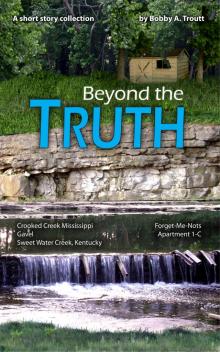 Beyond The Truth
Beyond The Truth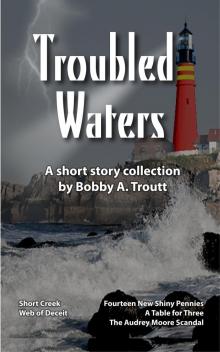 Troubled Waters
Troubled Waters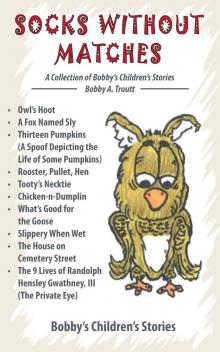 Socks Without Matches
Socks Without Matches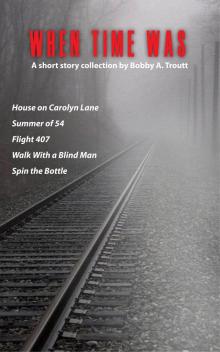 When Time Was
When Time Was Giggle's Holiday Book
Giggle's Holiday Book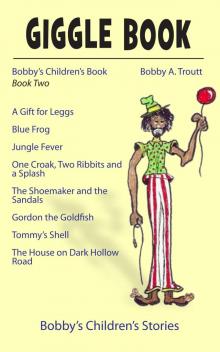 Giggle Book Two
Giggle Book Two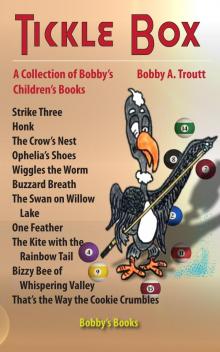 Tickle Box
Tickle Box Dead Limbs and Leaves
Dead Limbs and Leaves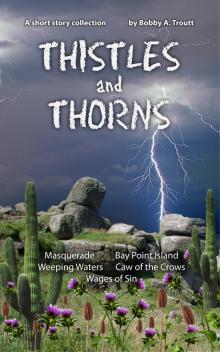 Thistles and Thorns
Thistles and Thorns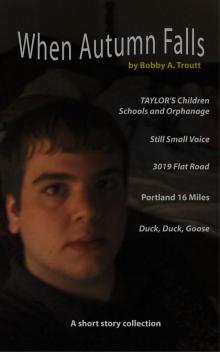 When Autumn Falls
When Autumn Falls A Cry in the Wind
A Cry in the Wind Leftover from the Holidays
Leftover from the Holidays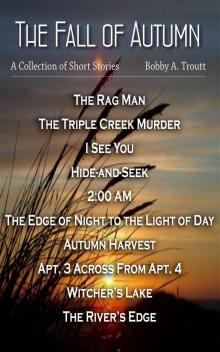 The Fall of Autumn
The Fall of Autumn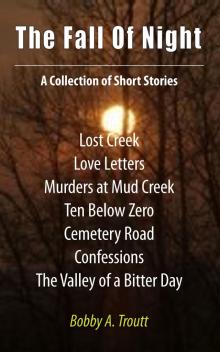 The Fall of Night
The Fall of Night Giggle Book Four
Giggle Book Four